Elizabeth Moss's Blog, page 3
December 21, 2013
Do Novels Make You Cry?
It occurred to me, seeing my bloodshot eyes in the mirror after putting down the book I had just finished reading, that I had never seen my husband cry while reading a novel.
Yet I do it quite regularly. Indeed, it's almost a benchmark for me of a novel's quality, if it can move me to tears.
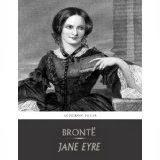 Romance or lit fic?Of course, this rarely applies when reading poetry or what I would call literary fiction. I'm talking largely about genre fiction here, and mainly romance. With poetry, if it's good, I do feel moved emotionally - perhaps 'thrilled' or 'disturbed' would be a better description - and frequently also moved to write something myself. But only a very few poems have brought me to tears, and no literary fiction that I can recall.
Romance or lit fic?Of course, this rarely applies when reading poetry or what I would call literary fiction. I'm talking largely about genre fiction here, and mainly romance. With poetry, if it's good, I do feel moved emotionally - perhaps 'thrilled' or 'disturbed' would be a better description - and frequently also moved to write something myself. But only a very few poems have brought me to tears, and no literary fiction that I can recall.
With literary fiction, it's more a sense of having some truth revealed. Not usually a truth which pertains to matters of the heart, but one about human nature in general, the momentary lifting of some veil covering one of the mysteries of life and death. Something important and significant, but not necessarily emotional in quality. The kind of quasi-mystical, revelatory impression one receives from reading almost anything by E.M. Forster, for instance. Or perhaps James Joyce, before he erroneously decided longer was better.
So is it normal to cry after reading a novel?
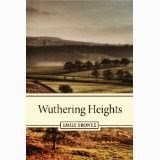 Is romance more literary if it's tragic?Perhaps the real issue for me personally is, why is something that can elicit a powerful emotional response often considered second-rate by those who value literary fiction above genre? Is it because these books work on an emotional level and don't necessarily uncover the mysteries of existence?
Is romance more literary if it's tragic?Perhaps the real issue for me personally is, why is something that can elicit a powerful emotional response often considered second-rate by those who value literary fiction above genre? Is it because these books work on an emotional level and don't necessarily uncover the mysteries of existence?
If only they could do both.
This continues to be a problem for me, both as a reader and a writer. I want to write romance which could also be considered literary, but the genre divides are now so sharply defined, that may no longer be possible.
With my head, I know that certain kinds of writing touch me deeply but intellectually, and that these are considered by the literary establishment - and often by common consent - more 'worthy' than the novels which touch me deeply but emotionally.
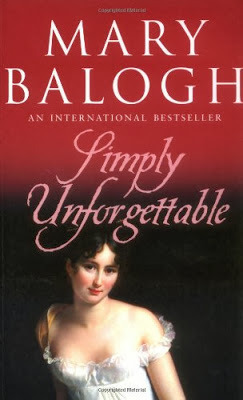
Confession time: romances by the marvellous Mary Balogh frequently make me blub.With my heart though, I admit to loving the latter and returning to them more often than the former. Much as I admire literary fiction, genre fiction is what turns the pages for me.
And makes me cry.
Yet I do it quite regularly. Indeed, it's almost a benchmark for me of a novel's quality, if it can move me to tears.
 Romance or lit fic?Of course, this rarely applies when reading poetry or what I would call literary fiction. I'm talking largely about genre fiction here, and mainly romance. With poetry, if it's good, I do feel moved emotionally - perhaps 'thrilled' or 'disturbed' would be a better description - and frequently also moved to write something myself. But only a very few poems have brought me to tears, and no literary fiction that I can recall.
Romance or lit fic?Of course, this rarely applies when reading poetry or what I would call literary fiction. I'm talking largely about genre fiction here, and mainly romance. With poetry, if it's good, I do feel moved emotionally - perhaps 'thrilled' or 'disturbed' would be a better description - and frequently also moved to write something myself. But only a very few poems have brought me to tears, and no literary fiction that I can recall.With literary fiction, it's more a sense of having some truth revealed. Not usually a truth which pertains to matters of the heart, but one about human nature in general, the momentary lifting of some veil covering one of the mysteries of life and death. Something important and significant, but not necessarily emotional in quality. The kind of quasi-mystical, revelatory impression one receives from reading almost anything by E.M. Forster, for instance. Or perhaps James Joyce, before he erroneously decided longer was better.
So is it normal to cry after reading a novel?
 Is romance more literary if it's tragic?Perhaps the real issue for me personally is, why is something that can elicit a powerful emotional response often considered second-rate by those who value literary fiction above genre? Is it because these books work on an emotional level and don't necessarily uncover the mysteries of existence?
Is romance more literary if it's tragic?Perhaps the real issue for me personally is, why is something that can elicit a powerful emotional response often considered second-rate by those who value literary fiction above genre? Is it because these books work on an emotional level and don't necessarily uncover the mysteries of existence?If only they could do both.
This continues to be a problem for me, both as a reader and a writer. I want to write romance which could also be considered literary, but the genre divides are now so sharply defined, that may no longer be possible.
With my head, I know that certain kinds of writing touch me deeply but intellectually, and that these are considered by the literary establishment - and often by common consent - more 'worthy' than the novels which touch me deeply but emotionally.

Confession time: romances by the marvellous Mary Balogh frequently make me blub.With my heart though, I admit to loving the latter and returning to them more often than the former. Much as I admire literary fiction, genre fiction is what turns the pages for me.
And makes me cry.
Published on December 21, 2013 03:53
December 9, 2013
WOLF BRIDE 99p promotion NOW ON!

WOLF BRIDE is currently reduced to 99p or just over $1
It's Fifty Shades of Tudor sex, by Harry! (The Sunday Times)
Wow, what a truly brilliant book. This truly exceeded all my expectations... This was a superb read, addictive, passionate, compelling and hot. A passionate love story which I cannot wait to continue with book two. (Victoria Loves Books)
The most inevitable literary mash-up of the 21st century. (The Independent)
It's not just the bodices that are being ripped off in this rollicking and rude romp through Tudor England... Well-written and will sweep you breathlessly along. (Star magazine) WOLF BRIDEHilary Mantel meets Sylvia Day: the first instalment in a deliciously erotic trilogy, set against the sumptuous backdrop of the scandal-ridden Tudor Court.
Published on December 09, 2013 02:34
November 28, 2013
What's Next After Nanowrimo?
 So you've written your 50,000 words in November, or as close to it as possible, and you're staring December in the face. Nanowrimo is over for another year. What on earth happens next?
So you've written your 50,000 words in November, or as close to it as possible, and you're staring December in the face. Nanowrimo is over for another year. What on earth happens next?Here is a suggested order of events for the post-Nanowrimo entrant:
1. Finish the novel, if you haven't already
Don't worry if this is going to take a while. The important thing is to keep the momentum going from November's daily word count. If you just set it aside and have a 'rest' before continuing, you will come back to it cold and creaking, and probably never finish it all. Keep writing. Get it done.
2. Put the finished manuscript aside for a few weeks
This stage is about getting some perspective on what you've just written. A freshly-written book is hard to assess. Step away, maybe plan out a new book, or do some research that you couldn't fit in during November.
3. Reread your novel
Set aside a full day to read your finished novel in one go, trying hard not to pause for anything except food and the bathroom. That way you'll get a good over-view. Avoid making notes except for major structural issues/errors.
 4. Rewrite your novel: Phase One, Major Structural Issues
4. Rewrite your novel: Phase One, Major Structural Issues
Rewrite your novel according to any serious problems you spotted with the structure. Maybe you need to cut the Prologue or Epilogue, or start at Chapter Three. Don't worry about line edits at this stage. Just think structure, pace, characterisation, motivation, consequences ... all the big stuff.
5. Rewrite your novel: Phase Two, Clean Up Your Prose
This is the nitty-gritty dull stuff of self-editing - or the most exciting phase of novel-writing, depending on your temperament. Put commas in the right place, don't overuse semi-colons, and ALWAYS check if a word is hyphenated. You may be surprised. Don't just rely on spellcheck, it may not spot their/there mistakes and certainly won't pick up on clumsy writing.
You may not think it's worth the effort, but try to develop your prose style into something fit for purpose. Cut long sentences in half, remove endless strings of adjectives and adverbs, make your verbs work harder for you - stride, not walk; bellow, not shout - and think about balance, especially in your paragraphing.
'Start a new paragraph for each new action' is a good simple rule, and that includes dialogue.
 6. Now write a synopsis
6. Now write a synopsis
A synopsis is basically a short document, most usefully one page, maybe 2-3, in which you briefly describe your main characters and the chief action of your story. Leave out anyone and anything non-essential. It's not a blurb - i.e. cover copy - because that merely sets out a scenario without giving you the end result. In the synopsis you must tell the reader not only how it starts, but how it ends. And God help you if you don't actually know by now.
This could become a selling document, so write and present it professionally. Check your spelling and punctuation. Try to sound sane. This may be your one and only chance to showcase your writing skills to a busy literary agent.
7. Send your synopsis (and three chapters) to a Literary Agent
These days only a very few publishers take manuscripts off the street. Most prefer to go through agents, which means you have to get an agent if you want anyone to read your novel. And getting an agent is TOUGH. Get a book like Writers and Artists Yearbook, and consult lists of agents there. Or look online. Find out who represents your genre and don't send science fiction to agents who say 'No science fiction' etc.
Check out their websites to see which named agent at that agency might be best for you, then address it by name - and spell their name right! Ring first to check they are still with that agency; agents move, it happens.
Present the synopsis and/or sample chapters exactly as required - some like snail mail, others email using a Word doc. - so you don't annoy them from the word go by failing to check their requirements. Sound professional in your covering letter, avoid exclamation marks, chatty small talk, and details about your life as a repo man. Be brief. Enclose a writing-specific CV, or just mention any publications or awards if these will be helpful.
You can approach several agencies at the same time. Just make sure you mention that politely in your letter, so they know what's what.
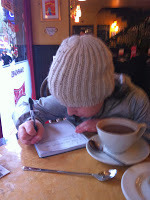 8. Keep writing while you wait
8. Keep writing while you wait
Waiting can take a long while. Longer than it took you to write the damn thing in the first place. So don't waste your precious time staring at the empty mailbox. Start writing or planning your next book or Nanowrimo project while you wait.
And be prepared for rejection. It's all part of the game.
Good luck!
Published on November 28, 2013 03:38
November 23, 2013
FREE DOWNLOAD Regency
My Double Bill (two stories in one edition) THE PETTICOAT CLUB is on free Kindle-only promotion this week. You don't have to have a Kindle to download it. Just follow the details on Amazon.
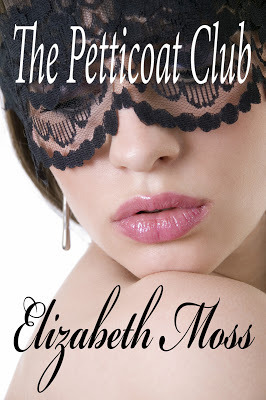 THE PETTICOAT CLUB: where genteel young ladies fight secretly for ladies' rights in Regency London
THE PETTICOAT CLUB: where genteel young ladies fight secretly for ladies' rights in Regency London
TWO REGENCY NOVELLAS IN ONE SPARKLING EDITION
The Petticoat Club is a Double Bill edition, comprising two Regency novellas: 'Poppeia and the Petticoat Club' and 'A Most Dangerous Lady' - both also available as individual titles.
The “Petticoat Club” is a secret organization of young ladies dedicated to righting wrongs against women. Highwaymen, romance, intrigue, and sexual misadventure abound in this two story volume.
Elizabeth Moss is an established English novelist. She is also the author of WOLF BRIDE (Hodder): 'well-written ... a rollicking romp through Tudor England that sweeps you breathlessly along. Four stars.' (Star Magazine)
DOWNLOAD FOR FREE ON KINDLE THIS WEEK
THE PETTICOAT CLUB on Amazon UK
THE PETTICOAT CLUB on Amazon US
plus
THE PETTICOAT CLUB on Amazon Germany
THE PETTICOAT CLUB on Amazon France
THE PETTICOAT CLUB on Amazon Italy
THE PETTICOAT CLUB on Amazon Spain
THE PETTICOAT CLUB on Amazon Canada
and
THE PETTICOAT CLUB on Amazon Australia
 THE PETTICOAT CLUB: where genteel young ladies fight secretly for ladies' rights in Regency London
THE PETTICOAT CLUB: where genteel young ladies fight secretly for ladies' rights in Regency LondonTWO REGENCY NOVELLAS IN ONE SPARKLING EDITION
The Petticoat Club is a Double Bill edition, comprising two Regency novellas: 'Poppeia and the Petticoat Club' and 'A Most Dangerous Lady' - both also available as individual titles.
The “Petticoat Club” is a secret organization of young ladies dedicated to righting wrongs against women. Highwaymen, romance, intrigue, and sexual misadventure abound in this two story volume.
Elizabeth Moss is an established English novelist. She is also the author of WOLF BRIDE (Hodder): 'well-written ... a rollicking romp through Tudor England that sweeps you breathlessly along. Four stars.' (Star Magazine)
DOWNLOAD FOR FREE ON KINDLE THIS WEEK
THE PETTICOAT CLUB on Amazon UK
THE PETTICOAT CLUB on Amazon US
plus
THE PETTICOAT CLUB on Amazon Germany
THE PETTICOAT CLUB on Amazon France
THE PETTICOAT CLUB on Amazon Italy
THE PETTICOAT CLUB on Amazon Spain
THE PETTICOAT CLUB on Amazon Canada
and
THE PETTICOAT CLUB on Amazon Australia
Published on November 23, 2013 04:59
November 7, 2013
Publication Day
 WOLF BRIDE hits the shelves today in paperback: browse on Amazon.com
WOLF BRIDE hits the shelves today in paperback: browse on Amazon.comPublished in paperback today: WOLF BRIDEBook One: Lust in the Tudor Court
The most inevitable literary mash-up of the 21st centuryThe Independent
Fifty Shades of Tudor sex!The Sunday Times
Find Wolf Bride on UK Amazon
Find Wolf Bride on US Amazon
Find Wolf Bride on the Hodder & Stoughton website
The stern Lord Wolf comes to the court of Henry VIII and Anne Boleyn to claim his virgin bride ...
Published on November 07, 2013 00:30
Publication Day Giveaway
 WOLF BRIDE hits the shelves today in paperback: browse on Amazon.com
WOLF BRIDE hits the shelves today in paperback: browse on Amazon.comPublished in paperback today: WOLF BRIDEBook One: Lust in the Tudor Court
The most inevitable literary mash-up of the 21st centuryThe Independent
Fifty Shades of Tudor sex!The Sunday Times
Find Wolf Bride on UK Amazon
Find Wolf Bride on US Amazon
Find Wolf Bride on the Hodder & Stoughton website
The stern Lord Wolf comes to the court of Henry VIII and Anne Boleyn to claim his virgin bride ...
***
This week, I'm giving away one copy of WOLF BRIDE: entrants from the UK or US only, thanks.
To enter for the draw, just tell me below whether you think Anne Boleyn was guilty of adultery or if it was a trumped-up charge so Henry could remarry?
Good luck! Elizabeth
 Wolf Bride Giveaway!!!!!
Wolf Bride Giveaway!!!!!
Published on November 07, 2013 00:30
October 29, 2013
A Literary Mash-Up or an Erotic Book Meld?
I just love publishing jargon. Some of it is so funny and fiercely inventive, it makes me smile. And I wanted to share with you the most marvellous example of it recently aimed at my new novel WOLF BRIDE.
WOLF BRIDE is out now in digital edition, but is launched in paperback on November 7th. So it's been doing the rounds of the newspaper desks. Last week, The Independent mentioned it in their weekly book news round-up, 'Between The Covers'.
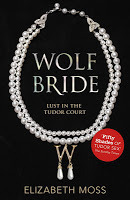 WOLF BRIDE
WOLF BRIDE
In this case, of course, there is no pre-existing text being incorporated, but rather a meeting - or melding - of two completely different literary vibes. So while not entirely an accurate description, applying the term 'literary mash-up' to WOLF BRIDE does at least have the merit of getting across an idea. The kind of political intrigues and shenanigans at King Henry VIII's court described in Mantel's WOLF HALL come together in my novel with the kind of steamy erotic content associated with one of romance's hottest writers, Sylvia Day.
Personally, I love the label 'literary mash-up.' How about you?
WOLF BRIDE is out now in digital edition, but is launched in paperback on November 7th. So it's been doing the rounds of the newspaper desks. Last week, The Independent mentioned it in their weekly book news round-up, 'Between The Covers'.
 WOLF BRIDE
WOLF BRIDE"The two most successful literary genres of the past three years have finally met, in the most inevitable literary mash-up of the 21st century. Wolf Bride by Elizabeth Moss is described as 'Hilary Mantel meets Sylvia Day.' ... It is published by Hodder and Stoughton on November 7th."A literary mash-up, for those who are unsure, is usually a book which incorporates another pre-existing text within it, often as a parody.
In this case, of course, there is no pre-existing text being incorporated, but rather a meeting - or melding - of two completely different literary vibes. So while not entirely an accurate description, applying the term 'literary mash-up' to WOLF BRIDE does at least have the merit of getting across an idea. The kind of political intrigues and shenanigans at King Henry VIII's court described in Mantel's WOLF HALL come together in my novel with the kind of steamy erotic content associated with one of romance's hottest writers, Sylvia Day.
Personally, I love the label 'literary mash-up.' How about you?
Published on October 29, 2013 06:00
October 23, 2013
A Neater Way To Nano
What Is NaNo?
I entered for NaNoWriMo last year, and am planning to enter again this year. For those who don't know what that means, NaNoWriMo stands for National Novel Writing Month and takes place every November. It's a free contest, with hundreds of thousands of entrants every year, and the idea is to write a 50,000 word novel in one month. If you hit 50,000 by the end of November, you are officially a 'Winner!' (There's no prize except kudos.)
ENTER NANOWRIMO HERE!
Last year I managed about 44,000 words, but that was largely because I didn't write some days during the month, as I had a busy schedule. (When don't I?)
This NaNoWriMo will be the same: I'm finishing a book right now which is unlikely to be done before November 6th. This means I'll have no time to prepare a synopsis or think about characters properly - I'm not even 100% sure what I'll be writing this NaNo, as I have several projects on the back burner - and will lose at least one week out of the four allowed. So it's unlikely I'll manage more than 35,000, I would guess. HOWEVER, I will still follow my own unique method of approaching NaNo, regardless of my need for extra speed.
How Most People NaNo
The accepted wisdom is that the NaNo entrant just slaps down any old words in any old order, and as long as it's vaguely literate, and moves the plot along, that's acceptable. In fact, it's broadly considered the ONLY WAY to approach the NaNoWriMo experience.
Editing of the novel is done AFTER November. Indeed, many entrants fully expect to be editing their 'finished' book for the next six months or more.
How I NaNo
I can't work like that. I'm a fast writer, don't get me wrong. I regularly finish novels in 6-8 weeks. But impatience comes along with that speed. When I've finished a novel, that's it. It's finished. Next, please. I'm happy to hand it over to my editor for any suggested revisions to the plot, and then a copyeditor for changes at a language level - luckily, these tend to be light. But I dislike having to go back over the book myself - except for a very general check for foolish errors and inconsistencies - before sending it to my publishers.
My opinion is that, if you edit as you go along, by the time you type THE END, your book really is finished. If you edit as you write, you can send it straight off with a clear conscience. No need to put it away for a few weeks, then revise and edit for a few months before considering it finished.
Of course this presupposes an editor or two down the line who will catch any major issues! But it has to be added, even editing your book for six months may not make it 'perfect'. If there is such a thing as a perfect novel, which I don't personally believe.
My Neater Way To NaNo
GET EACH SENTENCE RIGHT AND YOU REDUCE LATER EDITING TIMEThink about your novel in terms of sentences, not chapters. Each sentence builds and supports your novel. If it's a wobbly sentence, further down the line your paragraph - and even your whole novel - may fall over!When writing each sentence, consider balance and sense. LISTEN to your sentences. They are not just a means to an end, but an end in themselves. A happy sentence makes sense and looks balanced. Don't be afraid to be poetic in your prose. Or staccato if that suits you better. But be consistent. Set out your prose style on the very first page, the very first sentence - hopefully one that suits both you and the book you're writing - and stick with it. Sometimes it may take a few chapters to find the right narrative voice. Then you may want to go back and adjust earlier writing to match it. But only early on. Don't change styles mid-book or you will flounder horribly in a quagmire of your own making.Avoid moving on to a new sentence until you are pleased with the one you've just written. If you absolutely must move on, highlight that sentence in red and go back to it at the end of your writing time.
HOW TO WRITE SWIFTLY WHILE ALSO SELF-EDITING: try the following ideas. Getting the words right first time often means being SPECIFIC. Not a red car but a maroon Ford Fiesta (or hatchback if you want to be less specific). Not a dog but a Labrador. Don't take this to extremes though. If you draw too much attention to an object, it becomes 'important' and the reader will wonder why. Though obviously if it IS important - the killer was driving a maroon Ford Fiesta - that's okay.Plan your book. If you loathe pre-knowledge of your plot - um, why??? - then at least sketch out vaguely what should happen in each chapter or group of chapters. This will avoid the pitfall of writing at a tangent for 10,000 words and realizing later it adds nothing and has to be cut.Think: why does this scene exist? If it does not reveal character or move the plot forwards, cut it.Try to do this BEFORE you write it. (See above for planning.)All dialogue should reveal character. But avoid dialects and foreign languages, they almost never work except for a few words put in for flavour. He's Scottish. We get it. And don't include rambling dialogue to indicate character or you will bore your readers. Just suggest it: 'Mrs Hubbard continued to talk long after I had ceased to listen. My attention was focused on the body in the rocking chair.'Charge straight into scenes: don't introduce them, don't set the scene or drearily recap what went before. Don't info-dump ('The house had once belonged to my great-aunt, whose suicide in 1986 while I was studying Zoology at university led to my father's revelation that he too suffered from the same family illness ... ') but reveal backstory in drips, here and there.Overall, avoid anything extraneous to the dynamic interaction between characters which forms the basis of most great novels. Setting and landscape may be important in your novel - it always was for Hardy - but in that case, think of setting as a character and use it in a similar way. Make the setting actively do things, not just 'be'. Think of the moor in The Hound of the Baskervilles: it's practically a character in its own right, deceiving people, sucking the unwary into the bog in an almost malicious way.All the above will allow you to write swift and lean prose. Nothing unnecessary, everything serving a purpose. And above all, get the sentence right before moving on, and you will not need to waste months of your life editing your novel once NaNoWriMo is over.
I entered for NaNoWriMo last year, and am planning to enter again this year. For those who don't know what that means, NaNoWriMo stands for National Novel Writing Month and takes place every November. It's a free contest, with hundreds of thousands of entrants every year, and the idea is to write a 50,000 word novel in one month. If you hit 50,000 by the end of November, you are officially a 'Winner!' (There's no prize except kudos.)
ENTER NANOWRIMO HERE!
Last year I managed about 44,000 words, but that was largely because I didn't write some days during the month, as I had a busy schedule. (When don't I?)
This NaNoWriMo will be the same: I'm finishing a book right now which is unlikely to be done before November 6th. This means I'll have no time to prepare a synopsis or think about characters properly - I'm not even 100% sure what I'll be writing this NaNo, as I have several projects on the back burner - and will lose at least one week out of the four allowed. So it's unlikely I'll manage more than 35,000, I would guess. HOWEVER, I will still follow my own unique method of approaching NaNo, regardless of my need for extra speed.
How Most People NaNo
The accepted wisdom is that the NaNo entrant just slaps down any old words in any old order, and as long as it's vaguely literate, and moves the plot along, that's acceptable. In fact, it's broadly considered the ONLY WAY to approach the NaNoWriMo experience.
Editing of the novel is done AFTER November. Indeed, many entrants fully expect to be editing their 'finished' book for the next six months or more.
How I NaNo
I can't work like that. I'm a fast writer, don't get me wrong. I regularly finish novels in 6-8 weeks. But impatience comes along with that speed. When I've finished a novel, that's it. It's finished. Next, please. I'm happy to hand it over to my editor for any suggested revisions to the plot, and then a copyeditor for changes at a language level - luckily, these tend to be light. But I dislike having to go back over the book myself - except for a very general check for foolish errors and inconsistencies - before sending it to my publishers.
My opinion is that, if you edit as you go along, by the time you type THE END, your book really is finished. If you edit as you write, you can send it straight off with a clear conscience. No need to put it away for a few weeks, then revise and edit for a few months before considering it finished.
Of course this presupposes an editor or two down the line who will catch any major issues! But it has to be added, even editing your book for six months may not make it 'perfect'. If there is such a thing as a perfect novel, which I don't personally believe.
My Neater Way To NaNo
GET EACH SENTENCE RIGHT AND YOU REDUCE LATER EDITING TIMEThink about your novel in terms of sentences, not chapters. Each sentence builds and supports your novel. If it's a wobbly sentence, further down the line your paragraph - and even your whole novel - may fall over!When writing each sentence, consider balance and sense. LISTEN to your sentences. They are not just a means to an end, but an end in themselves. A happy sentence makes sense and looks balanced. Don't be afraid to be poetic in your prose. Or staccato if that suits you better. But be consistent. Set out your prose style on the very first page, the very first sentence - hopefully one that suits both you and the book you're writing - and stick with it. Sometimes it may take a few chapters to find the right narrative voice. Then you may want to go back and adjust earlier writing to match it. But only early on. Don't change styles mid-book or you will flounder horribly in a quagmire of your own making.Avoid moving on to a new sentence until you are pleased with the one you've just written. If you absolutely must move on, highlight that sentence in red and go back to it at the end of your writing time.
HOW TO WRITE SWIFTLY WHILE ALSO SELF-EDITING: try the following ideas. Getting the words right first time often means being SPECIFIC. Not a red car but a maroon Ford Fiesta (or hatchback if you want to be less specific). Not a dog but a Labrador. Don't take this to extremes though. If you draw too much attention to an object, it becomes 'important' and the reader will wonder why. Though obviously if it IS important - the killer was driving a maroon Ford Fiesta - that's okay.Plan your book. If you loathe pre-knowledge of your plot - um, why??? - then at least sketch out vaguely what should happen in each chapter or group of chapters. This will avoid the pitfall of writing at a tangent for 10,000 words and realizing later it adds nothing and has to be cut.Think: why does this scene exist? If it does not reveal character or move the plot forwards, cut it.Try to do this BEFORE you write it. (See above for planning.)All dialogue should reveal character. But avoid dialects and foreign languages, they almost never work except for a few words put in for flavour. He's Scottish. We get it. And don't include rambling dialogue to indicate character or you will bore your readers. Just suggest it: 'Mrs Hubbard continued to talk long after I had ceased to listen. My attention was focused on the body in the rocking chair.'Charge straight into scenes: don't introduce them, don't set the scene or drearily recap what went before. Don't info-dump ('The house had once belonged to my great-aunt, whose suicide in 1986 while I was studying Zoology at university led to my father's revelation that he too suffered from the same family illness ... ') but reveal backstory in drips, here and there.Overall, avoid anything extraneous to the dynamic interaction between characters which forms the basis of most great novels. Setting and landscape may be important in your novel - it always was for Hardy - but in that case, think of setting as a character and use it in a similar way. Make the setting actively do things, not just 'be'. Think of the moor in The Hound of the Baskervilles: it's practically a character in its own right, deceiving people, sucking the unwary into the bog in an almost malicious way.All the above will allow you to write swift and lean prose. Nothing unnecessary, everything serving a purpose. And above all, get the sentence right before moving on, and you will not need to waste months of your life editing your novel once NaNoWriMo is over.
Published on October 23, 2013 02:57
October 22, 2013
First review of WOLF BRIDE: 'addictive and compelling'
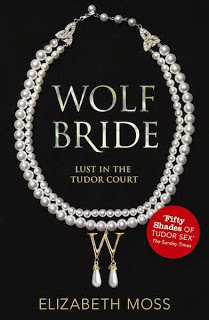 WOLF BRIDE: out Nov 7th The first blogger review of WOLF BRIDE was posted today at Victoria Loves Books. And Victoria's verdict on the paperback, which is out very shortly?
WOLF BRIDE: out Nov 7th The first blogger review of WOLF BRIDE was posted today at Victoria Loves Books. And Victoria's verdict on the paperback, which is out very shortly?'What I expected was a book with lots of sex, what I got was a truly addictive and compelling love story.'Read the rest of the review at Victoria Loves Books.
I am thrilled by this marvellous first review of WOLF BRIDE, which is my Tudor debut as Elizabeth Moss.
Victoria at Victoria Loves Books concludes her review:
'This was a superb read, addictive, passionate, compelling and hot. A passionate love story which I cannot wait to continue with book two. GOOD GOOD GOOD BOOK! LOVED IT!'
Published on October 22, 2013 05:57
October 5, 2013
Writers Speak Out
Are you a writer of romance or erotica?
I'm planning a series of short guest posts by writers of romance or erotica - traditionally, digitally or self-published - here on this site where writers can speak out about:
HOW they write
WHEN they write
WHY they write
You can be as polemical or soft-spoken as you wish, but you should be engaging. Funny is also a plus!
So if you're a writer who would love to speak out about the craft of writing, or the ins and outs of publishing, just send me cover jpgs and the usual blurb/details of a book or book series you'd like to promote. You should also include the above information - How, When, Why, plus anything extra you want to contribute by way of opinion about writing, in no longer than 400 words - and any necessary links to websites or book pages.
Some books may not fit my site, but if you feel there may be a concern over that, just ask!
Email me via j.holland442 @ btinternet.com - Word document or jpg attachments ONLY please.
I'm planning a series of short guest posts by writers of romance or erotica - traditionally, digitally or self-published - here on this site where writers can speak out about:
HOW they write
WHEN they write
WHY they write
You can be as polemical or soft-spoken as you wish, but you should be engaging. Funny is also a plus!
So if you're a writer who would love to speak out about the craft of writing, or the ins and outs of publishing, just send me cover jpgs and the usual blurb/details of a book or book series you'd like to promote. You should also include the above information - How, When, Why, plus anything extra you want to contribute by way of opinion about writing, in no longer than 400 words - and any necessary links to websites or book pages.
Some books may not fit my site, but if you feel there may be a concern over that, just ask!
Email me via j.holland442 @ btinternet.com - Word document or jpg attachments ONLY please.
Published on October 05, 2013 03:44



